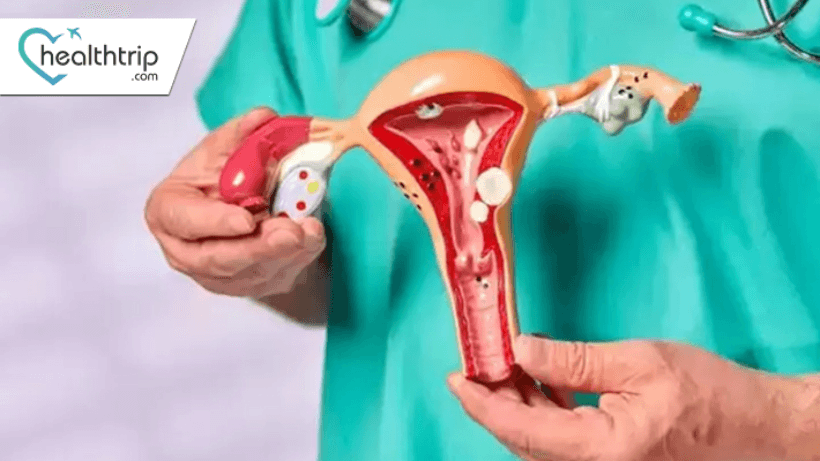
How Do Hormones Influence Vaginal Cancer? Get the Facts
20 Nov, 2023
 Healthtrip Team
Healthtrip TeamVaginal cancer, a rare form of cancer affecting the vaginal tissue, presents unique challenges and concerns. This blog aims to demystify the relationship between hormones and the development and progression of vaginal cancer, offering insights into how hormonal imbalances might influence this disease.
Most popular procedures in India
Hormones in the Female Reproductive System and Their Link to Cancer
Hormones are integral to the functioning of the female reproductive system, acting as key regulators of various physiological processes. The two primary hormones in this context are estrogen and progesterone.
Wellness Treatments
Give yourself the time to relax
Lowest Prices Guaranteed!

Lowest Prices Guaranteed!
- Regulating the Menstrual Cycle: Estrogen controls the growth of the uterine lining during the first part of the menstrual cycle.
- Vaginal Health: It maintains the thickness and lubrication of the vaginal wall and the integrity of vaginal tissue.
- Secondary Sexual Characteristics: Estrogen is responsible for the development of female secondary sexual characteristics during puberty.
2. Progesterone: This hormone complements the role of estrogen and is crucial, especially during the latter half of the menstrual cycle and pregnancy. Its functions include:
- Menstrual Cycle Regulation: Progesterone prepares the uterine lining for potential pregnancy after ovulation and moderates the effects of estrogen.
- Supporting Pregnancy: It is essential for maintaining the uterine lining and preventing contractions in the uterus during pregnancy.
The Hormone-Cancer Link
The link between hormones and certain types of cancer is an area of ongoing research and concern. Hormone-sensitive cancers are those that can grow in response to specific hormones. This section delves into how hormones, particularly estrogen, are implicated in certain cancers and the potential implications for vaginal cancer.
1. Hormone-Sensitive Cancers:
- Breast Cancer: Estrogen can stimulate the growth of certain types of breast cancer cells. This is why hormone receptor testing is critical in breast cancer to determine the best course of treatment.
- Endometrial Cancer: Similarly, estrogen can stimulate the endometrium (lining of the uterus), and its prolonged, unopposed exposure is a known risk factor for endometrial cancer.
2. Hormone Replacement Therapy (HRT):
- Increased Risk of Certain Cancers: HRT, particularly therapies that include only estrogen without progesterone (unopposed estrogen therapy), has been associated with an increased risk of breast and endometrial cancers. This risk is attributed to estrogen's ability to stimulate the growth of cells in these tissues.
- Relevance to Vaginal Cancer: Given estrogen's role in stimulating cell growth, there is a concern about its potential effect on vaginal tissue, which could influence the risk of vaginal cancer. This is particularly relevant in postmenopausal women who may use HRT to manage menopausal symptoms.
- Balancing Risks: While estrogen is essential for many aspects of female health, its role in cell growth can be a double-edged sword. It necessitates a delicate balance, especially in hormone therapies, to maximize benefits while minimizing risks.
- Individualized Approach in HRT: The decision to use HRT and the type (estrogen alone or in combination with progesterone) should be individualized, considering each woman's risk factors, including her personal and family history of cancer.
Hormones and Vaginal Cancer - The Direct Influence
The direct influence of hormones, particularly estrogen and progesterone, on vaginal cancer is an area of active investigation in medical research. Several key aspects of this relationship include:
1. Presence of Hormone Receptors in Vaginal Cancer Cells:
- Studies have detected estrogen and progesterone receptors in some vaginal cancer cells. This suggests that these hormones may play a role in the growth and development of these cancer cells.
- The presence of these receptors could imply that hormonal imbalances or exposure to external sources of hormones might influence the growth of vaginal cancers.
2. Complex Relationship:
- Unlike breast or endometrial cancer, where the role of hormones is more established, the relationship between hormones and vaginal cancer is less clear and more complex.
- There is a need for more focused research to understand how hormonal changes, particularly those occurring during menopause, might contribute to the development or progression of vaginal cancer.
3. Hormonal Imbalances and Menopause:
- Menopause, characterized by a significant decrease in estrogen production, can lead to various changes in the vaginal tissue, potentially influencing cancer risk.
- Hormonal imbalances or fluctuations during this period might increase susceptibility to vaginal cancer, though the exact mechanism remains to be fully elucidated.
Find Out More: Personalized Medicine in Vaginal Cancer: Is It Right for You? (healthtrip.com)
Indirect Influences of Hormones on Vaginal Cancer
Hormonal changes can also have indirect effects on the risk and progression of vaginal cancer:
1. Interaction with Human Papillomavirus (HPV):
- HPV is a major risk factor for vaginal cancer. Hormones might impact the body's response to HPV infection or the virus's behavior in the body.
- There is ongoing research into how hormonal factors, such as those present during different phases of the menstrual cycle or during menopause, might affect HPV's ability to cause cancer.
2. Changes During Menopause:
- The decline in estrogen levels during menopause leads to thinning and decreased elasticity of the vaginal tissue, which might theoretically influence cancer risk.
- How these tissue changes interact with other risk factors for vaginal cancer is a subject of ongoing study.
Hormonal Therapy and Vaginal Cancer Treatment
Prevention and Monitoring
Managing hormonal health could play a role in preventing vaginal cancer:
1. Careful Use of HRT:
- Hormone Replacement Therapy, especially when used for managing menopausal symptoms, needs to be approached carefully, considering the individual's cancer risk profile.
- Balancing the benefits of HRT against potential cancer risks is crucial, especially for those with a family history of gynecological cancers.
2. Regular Gynecological Exams:
- Regular exams and screenings are essential for the early detection of vaginal cancer, particularly for women at higher risk.
- These exams might include pelvic exams, Pap tests, and HPV testing, which can help in monitoring for signs of cancer or pre-cancerous changes in the vaginal tissue.
The intricate relationship between hormones and cancer risk is crucial for both prevention and treatment strategies. While estrogen and progesterone are vital for the normal functioning of the female reproductive system, their role in cancer development, particularly in hormone-sensitive tissues, necessitates careful consideration, especially in therapeutic contexts like HRT. The potential impact of these hormones on vaginal cancer, although less clear than in breast or endometrial cancer, highlights the need for ongoing research and individualized healthcare approaches.
Most popular wellness packages
Related Blogs

The Unseen Enemy: The Rise of Vaginal Cancer
Vaginal cancer is a type of cancer that affects the

Dos and Don'ts: Lifestyle Choices Affecting Vaginal Cancer Risk
Vaginal cancer is a serious condition that can affect women.

Considering Alternative Therapies for Vaginal Cancer? Weighing the Pros and Cons
Vaginal cancer, a relatively uncommon but complex condition, predominantly affects

Vaginal Cancer : Symptoms to treatment
In this blog, we'll delve into the often-neglected topic

Understanding The Difference Between HRT and Hormone Therapy- Which One Do You Need
If you have been recently diagnosed with cancer, whether it’s










